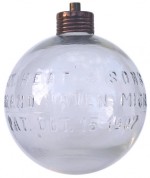
The
float in your toilet tank that measures the water level is probably
made of rubber or plastic. An old one might be metal. But even earlier,
tank floats were made of blown glass. And glass being what it is, these
floats are kind of rare now. Collector’s Weekly tells us all about glass
toilet floats in a conversation with antique expert (and
Rare Earth keyboard player) Mike Bruner.
“That’s a really beautiful float,” he practically gushes
when I ask him about a plain, innocuous-looking float with the words
“Patent applied for” embossed on its side. “The glass on that, I just
love. It’s very crude, but it’s probably the nicest appearing glass I
have.”
I look again. It doesn’t seem all that remarkable to me, but Bruner’s
vision is keener than mine. Where I see a boring oblong form, he sees
history, and even art. “It’s obviously handmade, and I’d be willing to
bet it could date to the 1800s,” he says. “It’s not symmetrical in its
shape. It’s just what people who collect glassware want. They want
something that tells a story. There’s no doubt that a human being made
this thing. It went into a three-piece mold, so it’s definitely a
production piece, but a human being blew the glass and snapped off the
rod at the end. This thing is full of charisma.”
Have you ever seen a glass float? .
 The
float in your toilet tank that measures the water level is probably
made of rubber or plastic. An old one might be metal. But even earlier,
tank floats were made of blown glass. And glass being what it is, these
floats are kind of rare now. Collector’s Weekly tells us all about glass
toilet floats in a conversation with antique expert (and Rare Earth keyboard player) Mike Bruner.
The
float in your toilet tank that measures the water level is probably
made of rubber or plastic. An old one might be metal. But even earlier,
tank floats were made of blown glass. And glass being what it is, these
floats are kind of rare now. Collector’s Weekly tells us all about glass
toilet floats in a conversation with antique expert (and Rare Earth keyboard player) Mike Bruner.
No comments:
Post a Comment